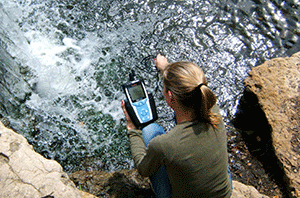Conductivity tests a solution’s ability to conduct electrical current and serves as a quick and simple indicator of water quality. Assessing the level of water purity via conductivity can help prevent contamination.
 Water measured for conductivity comes from aquariums, waste streams, cooling towers, steam boilers, or laboratory research, among other applications.
Water measured for conductivity comes from aquariums, waste streams, cooling towers, steam boilers, or laboratory research, among other applications.
Conductivity meters are a common means of measuring conductivity. Most conductivity instruments are microprocessor based and don't drift. However, small physical changes to the cell can change readings over time.
For best results, verify performance with certified calibration standards at regular intervals. Typically, multifunction calibrators, standards-grade reference multimeters, and precision resistors (per the manufacturer’s procedures) are used to calibrate conductivity and resistivity meters by a calibration service provider.
In InnoCal’s ISO17025-accredited lab, your conductivity meter will be tested to the manufacturer’s accuracy or to those of your choosing. We maintain a full fleet of electronic calibrators, ISO Guide 34-accredited conductivity solutions.